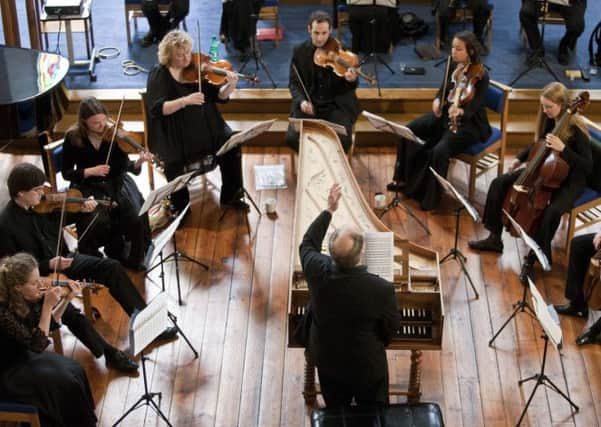Classical review: The Dunedin Consort


In 18th century Europe coffee was considered an alternative to sex, “a displacer of erotic desires”. Whether that was just an indicator of the excellent quality of pre-Enlightenment coffee or the lousy state of 18th century sex is not clear.
What we know for sure is that the coffee houses were the seething hothouse of middle-class intellectual public debate in the years leading up to the Enlightenment, especially in the city of Leipzig where, in the last years of the 17th century and first half of the 18th century, an emerging nouveau riche of traders, entrepreneurs and thinkers were keen to find their own “public sphere” – a forum in which to discuss things dangerously political and not necessarily for the ears of the aristocratic elite.
Advertisement
Hide AdMusic played its part, as two concerts this week – one in Edinburgh, the other in Glasgow – intend to remind us. In these, two of Scotland’s leading university music professors will fuel a hot musical debate over a cup of coffee and a sing-song. The music – symbolically by Johann Sebastian Bach – and the choice of refreshment are not unconnected.
As John Butt (Gardiner Professor at Glasgow) and Simon Frith (Tovey Professor at Edinburgh) intend to prove, along with the musicians of Butt’s Dunedin Consort, Bach and the bean were hot ingredients for 18th century discourse.
By understanding what part the Leipzig coffee houses played in defining specific aspects of Bach’s compositional style, they will argue we are able to fill what CPE Bach once referred to as the “inevitable gaps” in our knowledge of his father’s life and music.
In a broader sphere of investigation they will also question why Bach’s coffee house activity in Leipzig from the 1720s to 1740s played its part in that inevitable transition to larger-scale public concert-giving; in Leipzig’s case, the founding in 1781 of the famous Gewandhaus concert hall and orchestra.
The problem with Bach’s time in Leipzig, where he spent the final 27 years of his life, is that we think of it as a period Bach spent exclusively in the employ of the church. While that is true to a point – he exercised musical jurisdiction over several of the key municipal churches, composing cantatas weekly for the services – he also inherited the student musicians of the Collegium Musicum that his predecessor Telemann had established to undertake more secular, in some cases more daring, performances.
And the outlets for these were Leipzig’s bustling coffee houses, the most famous being that of Gottfried Zimmermann, where many of Bach’s secular cantatas – including the famously satirical Coffee Cantata – and orchestral works were first performed.
Advertisement
Hide Ad“We wrongly assume that his secular music making was done while Kapellmeister at Cöthen, and that Leipzig was purely church and keyboard music,” says Butt, who has written prolifically on the composer. “But in fact more evidence has emerged about the huge number of performances he planned and directed in Zimmermann’s coffee house and garden, including bits of Handel opera which people thought he had very little connection with at all. Somebody also recently worked out that he actually had more hours of public exposure making music through coffee houses than he did through the church.”
Which begs the obvious question regarding Wednesday’s “Coffee & Enlightenment” concert and discussion in Greyfriars Kirk featuring two Bach cantatas and the wonderful Orchestral Suite No 3: why hold it in a church? “Simple answer, really,” Butt explains. “We just couldn’t find a secular venue in Edinburgh that was available or would work.” Thursday’s Glasgow audience will gain a more authentic experience at the Glad Café in the city’s south side.
Advertisement
Hide AdWhat seems more important to Butt is conjuring up that sense of danger and unpredictability, both musically and intellectually, that was a feature of Bach’s coffee house concerts. Having Frith, a sociologist by training and former influential rock critic, as part of the mid-concert discussion is deliberately provocative. Butt wants him to talk about “why we should be frightened by Bach, and why we’re not.” As yet, he has no idea how Frith will respond, but fully expects him to relate his answers to issues in our own time.
“As someone who wrote about pop in its earlier manifestation, when it was allied to political causes, I think Simon will talk about why, like all music, it got sucked into commercial mindlessness,” says Butt. “One of the things I’m trying to get to is this notion that classical music has an urgency and immediacy that relates to the way people discuss, think and operate, rather than what it became in the 19th century, just an escape from the world rather than a way of commenting on it. I want to know whether we can find a more immediate environment for it today, where it actually does inspire thought.”
This week’s concerts, he says, are a pilot for a bigger crusade. “We’re going to have a whole series of these over the next couple of years,” he promises. “The idea is first to explore venues for 18th century classical music, which is very important for music conceived before the modern concert hall traditional took shape.
“But secondly, these settings were famous for fermenting ideas and public debate – places where what you might call non-governmental opinions were formed in the late 17th, early 18th century.
“I’m basically welding these two functions together, and hoping to get a major research project going that looks into the different ways music was used across Europe, particularly up to the 1770s, and especially in the coffee houses. I’m convinced it will help us find new, more vital ways of concert presentation today.”
Much coffee will be consumed along the way.
The Dunedin Consort presents Bach 300: Coffee & Enlightenment at Greyfriars Kirk, Edinburgh on Wednesday and at the Glad Café Glasgow on Thursday, www.dunedin-consort.org.uk